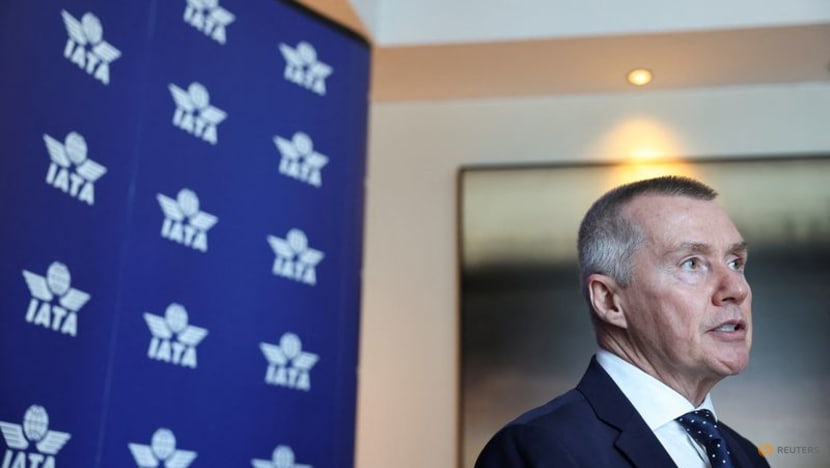Aircraft supply chain issues likely to persist until 2026, says IATA chief Willie Walsh
This has forced some airlines to reintroduce aircraft that they had planned to retire, said IATA director-general Willie Walsh in an interview with CNA's Roland Lim.


This audio is generated by an AI tool.
Global supply chain issues affecting the delivery of new aircraft could well persist into 2026, said International Air Transport Association (IATA) director-general Willie Walsh.
“We're not getting the new aircraft that a lot of airlines have banked on. It has also forced some airlines to reintroduce aircraft that they had planned to retire,” he told CNA on the sidelines of the IATA Annual General Meeting and World Air Transport Summit on Sunday (Jun 2).
“So it's been very disruptive. The best I can say about the supply chain problems is that it doesn't appear to be getting worse.
"It's stabilised at a bad position, but we think this will continue to impact the industry through this year, 2025, and probably into 2026.”
AIRLINE PASSENGERS, REVENUES TO HIT RECORDS
Aviation leaders gathered for the three-day global airlines event in Dubai to discuss ways to navigate around geopolitical instability, growth pressures from strained supply chains, and sustainability targets.
Despite the challenges, airlines will fly nearly 5 billion passengers this year and revenues will soar close to US$1 trillion, both record highs, the IATA said on Monday.
The trade body also expects the world's airlines to post US$30 billion in net earnings this year, up from its previous estimate of US$25.7 billion.
The Asia Pacific, in particular, is growing at a healthy level, and has opened “a little bit earlier than we had expected”, said Mr Walsh.
But the progress has been affected by China’s poorer-than-expected recovery, he added.
“We've not seen the number of flights between China and the United States getting anywhere close to where it was. I think these will be resolved over time, but it has impacted on the rates of recovery in the Asia-Pacific region.”
FUEL STILL BIGGEST COST COMPONENT FOR AIRLINES
The IATA chief said fuel is still the biggest cost component for airlines, accounting for 31 per cent of all operating costs.
“We're seeing some of the jet fuel prices moderated a little bit, but it's certainly still the single biggest cost that airlines have to face,” he said.
Jet fuel would likely average US$113.8 per barrel this year, said the trade body.
“We've seen incredible volatility, and geopolitical issues have an immediate impact on the price of oil and can impact supply and demand,” said Mr Walsh.
“But it's been a little bit more stable in the past few months than we'd seen during the past two years.”
The industry is hoping that various conflicts around the world, including in Ukraine and Gaza, can be resolved soon.
“The impact has largely been in the areas surrounding the conflicts,” said Mr Walsh.
“Globally, the impact that these have has been on the price of oil. That's moderated a bit since supply of Russian oil has been replaced by supply elsewhere.”
However, the volatility in jet fuel prices still weighs on the airline industry, which is seeing higher airfares as carriers try to recoup additional costs.
“Inflation for our industry has been higher than consumer inflation, because of the impact of fuel for the airline industry, and we've seen quite a bit of volatility in jet fuel prices,” said Mr Walsh.
“So it is important that when people talk about higher fares that they remember that inflation has impacted on everything.
“We do recognise that fares are higher, but they're higher because costs are higher.”
AIR SAFETY BACK IN THE LIMELIGHT
Aviation safety was also among the concerns raised at the Dubai meeting, following severe turbulence incidents involving Singapore Airlines and Qatar Airways last month.
Singapore Airlines flight SQ321 had been flying from London to Singapore when it encountered extreme turbulence. One passenger died and dozens were injured, resulting in an emergency diversion of the plane to Bangkok.
Meanwhile, 12 people on Qatar Airways flight QR017 from Doha to Ireland were injured during a bout of turbulence. The plane landed as scheduled.
The industry remains completely focused on safety performance, said Mr Walsh, adding that 2023 was probably the safest year in the history of aviation.
“It's safe because we work hard to ensure that it's safe. We learn from experience, we learn from all of the incidents, we examine them, (and) we share the learnings to make sure that everybody can get the benefit of all of these tragic events,” he added.
“So our industry is laser-focused on performance and laser-focused on doing everything we can to maintain the very high standards of safety.”
To manage the supply chain issues, Emirates deputy president and chief commercial officer Adnan Kazim said the airline has ramped up the number of older aircraft from 120 to 191 through its retrofit programme.
The programme, a way to address to fill in gaps in the interim, involves adding premium economy seats, he added.















